The Climb to Becoming a Motivational Speaker: Filled with Challenges Not Expected

Four years ago, on a beautiful spring day much like today, I stepped way beyond my comfort zone and ziplined above downtown Vancouver traffic. That moment has since had a ripple effect in my life.
Most unexpectedly (or, perhaps not so much if I am truly honest about it), that “stare fear in the face†moment led me to shift from consulting on web accessibility – a safe, almost expected career choice given my set of circumstances – to embracing “My Second Most Unlikely Career Choiceâ€, that being a motivational speaker.
However, not only has the scared spitless moment had an effect, but the tower of stairs and the necessary climb have also become symbolic. Much like speaking to an audience, much effort and sweat was needed to get to that “fun, exhilarating†moment.
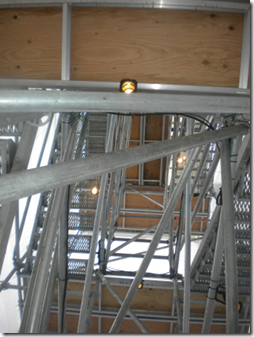
Since making the decision to become a motivational speaker, I have faced the toughest – emotionally and health wise – year (so far) of my adult life.
I have dealt with the illness and subsequent loss of my furbaby Faith. The gut-wrenching decision that I had to make and be present for, back on May 22nd, still haunts me. I have since discovered that grief is an extremely lonely place and needing to defend my grief, on occasion, only adds to my pain. In all honesty, I have faced several dark moments in which I felt like I was barely hanging on. I’d begin trying to claw my way back, only to lose my grip again.
Then came my Buddy boy. i can’t say for sure if I was completely ready for another furbaby at that point, but it was what the Universe had in store for me. I must have had selective amnesia from having Faith since she was 5-6 weeks old because I had totally forgotten how much work young kitties are. I have never seen a kitty decimate plants the way the Budmeister went after my spider plants and ficus tree. Darrell and I were constantly up righting the six-foot Robert Plant and cleaning up potting soil. How can one cute, adorable, affectionate kitty wreak such havoc, I do not know.
The third blow was when I went back to bed on December 14th, sick. At some point the bronchitis morphed into sinusitis. I am still not fully back to myself, even after three rounds of antibiotics and two rounds with the nebulizer, in which I was forced to face my lingering fear of the mask – a fear instilled as a child when facing the black rubber gas mask in the operating rooms. With the nebulizer, it was difficult to breathe normally while I was in panicked tears. After two rounds of three times a day for ten days, I eventually conquered my fear of that clear plastic mask, but I hope I never need to don another medicinal mask again.
I have never been sick for this long. My ears are still plugged and I am having trouble hearing. I have no energy, even with the iron pills that I started taking a year ago.
It is difficult to be motivational when one doesn’t even feel motivated.
Back when I was discussing my career shift with business consultant and coach Charlie Gilkey, he did say that there would be challenges along the way. What an understatement that has proven to be! I did not expect these kinds of challenges. The metaphorical tower of stairs to becoming a professional speaker feels way, way taller and far more difficult than the 81 stairs I climbed four years ago.
After the last fifteen months, which ranks way up there on the “This Sucks the Big One†Scale with the year my parents separated and divorced, challenges like explaining to event organizers how someone with a significant speech impairment can deliver a presentation of high value, getting to the venues and up on stage, and having the right words to deliver the best message that I can will be a cakewalk.
Looking back, climbing those 81 stairs with support from my lifelong friend Karen and my cousin Craig, yet another realization came to mind: as a young child, I became known as the “I’ll do it myself†girl, always preferring to do things myself, in the name of independence, rather than have others help me. Somewhere along the line that independence became perceived or interpreted as a preference for working alone. Perhaps, there was some truth in that. I always dreaded group projects in school for fear I would end up doing more than my share of the work; and, that often proved to be the case.
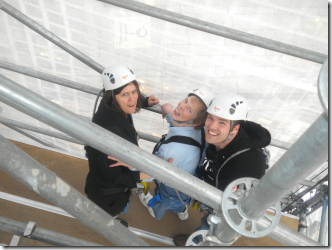
However, now I am feeling an urge to change that. Without Karen and Craig, I wouldn’t have stepped out of my comfort zone to have experienced the zipline. It saddens me that I could be missing out on those experiences in my work life.
i am looking around and witnessing other people, other friends, collaborating on exciting projects with others. I would like to experience that, too; working together, each contributing our own abilities and talents, n order to reach new, exhilarating heights together.
Perhaps it is now time to find opportunities to work together, to face my fears in the face and to go for it anyway. By doing so, I wonder where I might find myself four years hence.
If you enjoyed this post, consider buying me a chai tea latte. Thanks kindly.
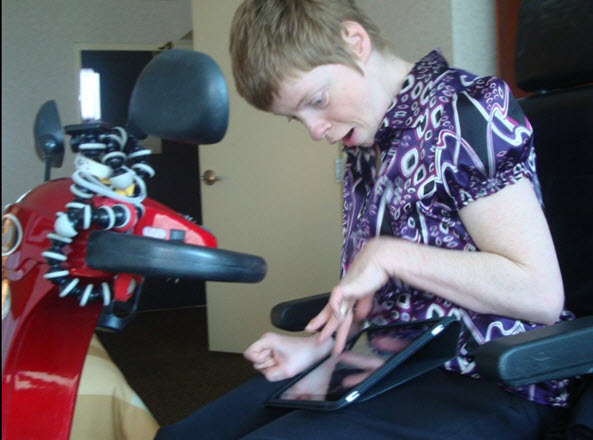 As an individual with a significant speech impairment, I have experienced inequitable treatment in countless ways. The most impactful have been in the areas of employment and healthcare.
As an individual with a significant speech impairment, I have experienced inequitable treatment in countless ways. The most impactful have been in the areas of employment and healthcare. 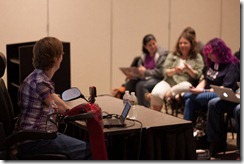
 For this reason and many others, Communication Disabilities Access Canada (CDAC) is launching a 2.5-year national project
For this reason and many others, Communication Disabilities Access Canada (CDAC) is launching a 2.5-year national project 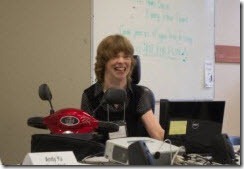
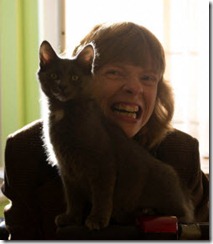
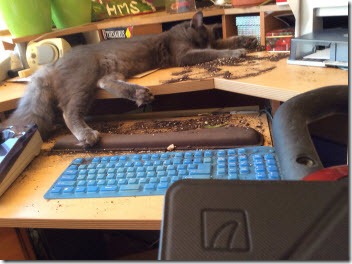


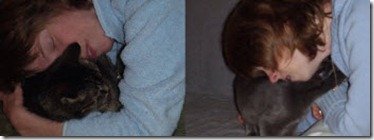


 Subscribe via RSS
Subscribe via RSS



